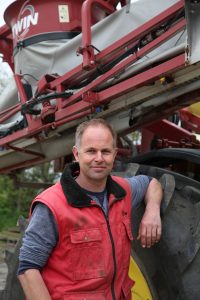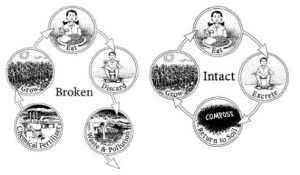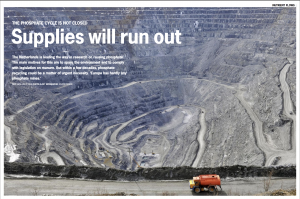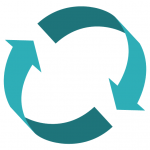 When I was growing up, people used to worry about running out of oil. That has changed, as many of us now worry about whether we can keep enough of those fossil fuels in the ground to limit the dangerous effects of climate change. We also worry about the effects of climate change on our ability to feed the ever-increasing number of people on our planet. And about the negative impacts of agriculture and food processing on our environment, such as pesticides and water used to grow foods and methane emissions from livestock. But just recently, I understood that we also need to worry about running out of key nutrients in our food, such as phosphorus.
When I was growing up, people used to worry about running out of oil. That has changed, as many of us now worry about whether we can keep enough of those fossil fuels in the ground to limit the dangerous effects of climate change. We also worry about the effects of climate change on our ability to feed the ever-increasing number of people on our planet. And about the negative impacts of agriculture and food processing on our environment, such as pesticides and water used to grow foods and methane emissions from livestock. But just recently, I understood that we also need to worry about running out of key nutrients in our food, such as phosphorus.
I met up with Henk Geerligs for an inspiring, yet worrying conversation about food. Henk is a farmer who grows seed potatoes for HZPC, a potato company that aims to contribute to the development of responsible food for a growing world population. I expected a conversation about potatoes and sustainable agricultural practices, but instead, we talked mostly about the circular economy and resource constraints in agriculture. Here’s what I learned from our conversation and further research.
The circular economy of food
Discussions about circular business models are mostly about products like phones, washing machines, clothing and construction materials. To make these business models more circular, we often look at nature and its cycles for inspiration. In order to reduce resource constraints, products need to be designed, manufactured, used and owned differently. But what about our food? Is how we grow what we eat still close enough to nature to be circular? Unfortunately, it isn’t. When looking at just one element in the nutrient cycle – phosphorus – it becomes very clear how far something as natural as growing food has diverged from nature’s cycles.
 Phosphorus is essential for all living things on our planet. It’s in our bones, enzymes, DNA and an important source of energy for our cells. There is a natural phosphorus cycle: plants absorb it from the soil, we eat the plants (or animals that eat the plants), phosphorus is returned to the soil through excrements and through decomposition after we die. This seems circular, but the reality is more linear. With people at the top of the food chain, most of the excrements end up in sewage systems. The sludge that’s left after recovering water from sewage is burned or used as an ingredient for asphalt. So the phosphorus is lost forever, breaking the cycle.
Phosphorus is essential for all living things on our planet. It’s in our bones, enzymes, DNA and an important source of energy for our cells. There is a natural phosphorus cycle: plants absorb it from the soil, we eat the plants (or animals that eat the plants), phosphorus is returned to the soil through excrements and through decomposition after we die. This seems circular, but the reality is more linear. With people at the top of the food chain, most of the excrements end up in sewage systems. The sludge that’s left after recovering water from sewage is burned or used as an ingredient for asphalt. So the phosphorus is lost forever, breaking the cycle.
Experts estimate that the phosphorus resources available are enough to manufacture fertilizer for the next 300 years. That seems like a long time. But when you realize that without phosphorus there’s no food, you know we have to act now. Not in the least as the remaining resources are concentrated in just three countries (China, Morocco, and the USA), which could create scarcity and turn this into a geopolitical issue.
Too little or too much phosphorus?

Paradoxically, while some people might worry about securing a long-term supply of phosphorus, others worry about a surplus of phosphorus. In some parts of an agriculture-intensive country like the Netherlands, there is actually a surplus of phosphorus. Manure from farms contains phosphorus in the form of phosphates. There is actually more manure than can be used to fertilize the Dutch farmlands. Dutch farmers export manure to other countries, but a substantial amount of manure is burned in electricity plants. Both are problematic. Exporting manure is costly, and burning manure means phosphorus gets lost.
Fortunately, the University of Wageningen is working on solutions, like the Green Minerals Plant. This pilot plant extracts phosphates from manure so they can be used as an ingredient for fertilizer. They are also working on better fertilizers and fertilization methods, to avoid over-saturation of farmland and more effective use of the phosphorus resource we have. You can read more about their work on phosphorus and phosphate in a recent edition of their magazine, Wageningen World.
What other cycles do we need to close urgently?
Henk has a strong conviction that we have a responsibility for our planet towards future generations. His own children remind him of this every day.
“When it’s our time to go, we should leave the planet in a better state than it was when we were born. With an ever-increasing global population and our current ways of growing food and producing other goods, this is nearly impossible.”
 My talk with Henk made me realize there are so many cycles and loops that I am simply unaware of. There must be so many others. Which cycles concern you most? Are they already top of mind in society at large or just within a small bubble of people-in-the-know?
My talk with Henk made me realize there are so many cycles and loops that I am simply unaware of. There must be so many others. Which cycles concern you most? Are they already top of mind in society at large or just within a small bubble of people-in-the-know?
Interview by Marjolein Baghuis (@mbaghuis) for Change in Context. To read interviews with interesting people, book reviews and other posts about change, communications and sustainability, please subscribe in the right-hand column.
